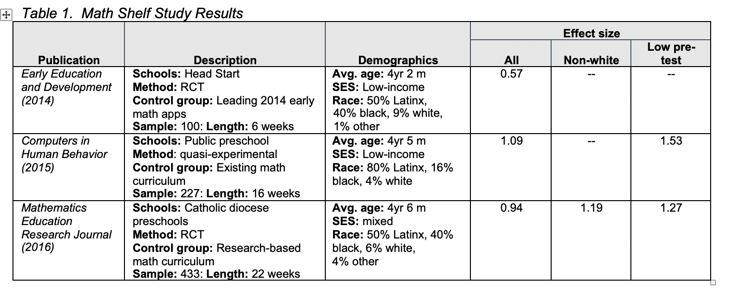Math Shelf's Evidence Base
Math Shelf was developed to eliminate early math achievement gaps at scale by providing high-quality math learning opportunities for low-income children on tablet computers. Research shows that proficiency in early math is critical for children's long-term school and life success. However, the majority of low-income children start kindergarten one year behind their peers in math, and this achievement gap widens to 2.5 years by fifth grade.[1] If educators work to eliminate math achievement gaps in pre-K and Kindergarten, we'll reduced time and money spent on later interventions, and put many more children on the path to school and life success.
Math Shelf's Evidence Base
Two peer-reviewed randomized controlled trials, and one peer-reviewed quasi-experimental study demonstrate that Math Shelf significantly increases student achievement compared to in-class teaching and other leading digital early math programs.
Studies were conducted in organizations serving low-income students, and included primarily Black and Latino populations. While effect sizes were uniformly large (ranging from 0.57 to 1.53; 6 months to 1.5 years more learning than controls), variation is likely due to study duration and implementation fidelity. Of particular interest is the finding that initially low performing and minority students made the greatest math learning gains with Math Shelf. Table 1 provides a summary of Math Shelf’s empirical results:

When comparing Math Shelf to other early math digital programs, Math Shelf produces 3x the learning, in significantly less time. Children need to only play Math Shelf twice a week for 10 minutes each session to achieve these achievement results. Most critically, Math Shelf is easy to implement, requires little teacher training, and minimal teacher supervision to implement the program successfully.
Interested in learning more ? Contact John Schacter, Ph.D.
[1] Isaacs, J. B., Starting School at a Disadvantage: The School Readiness of Poor Children, Washington, DC: Center on Children and Families at the Brookings Institution (March 19, 2012). Retrieved from https://www.brookings.edu; National Research Council. (2009). Mathematics learning in early childhood: paths toward excellence and equity. Washington: National Academies Press.
[2] Jordan, N. C., & Levine, S. C. (2009). Socioeconomic variation, number competence, and mathematics learning difficulties in young children. Developmental Disabilities Research Reviews, 15, 60–68; Schacter, J., & Jo, B. Improving preschoolers’ mathematics achievement with tablets: a randomized control trial. Mathematics Education Research Journal. 2017; 1-15.


